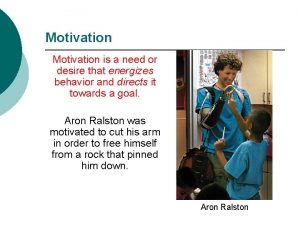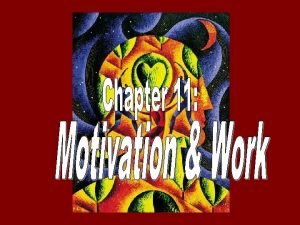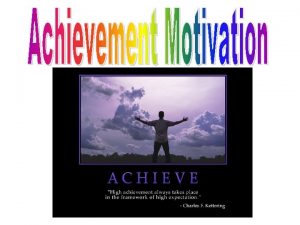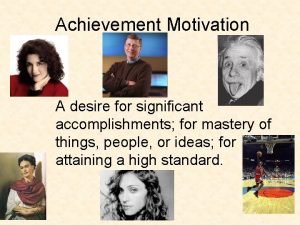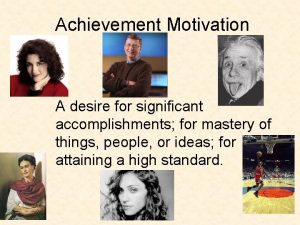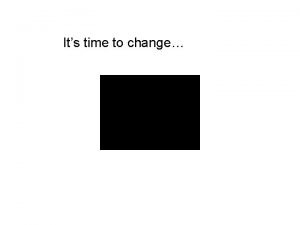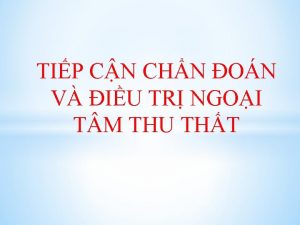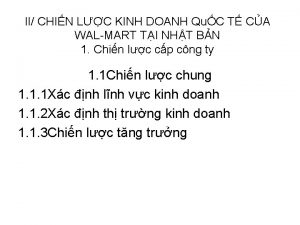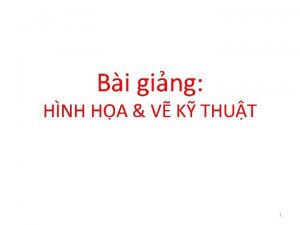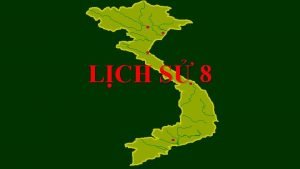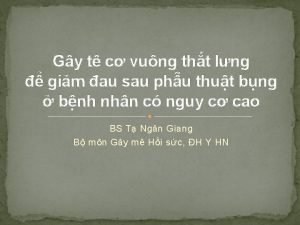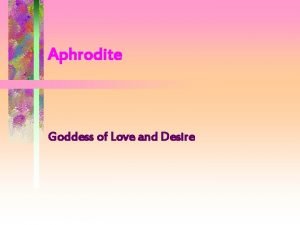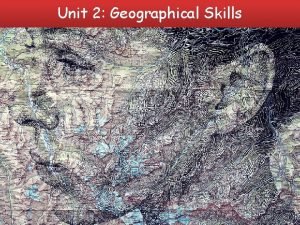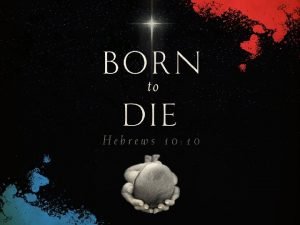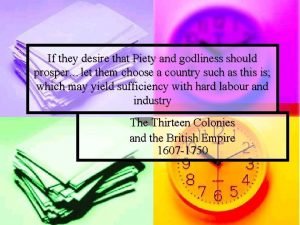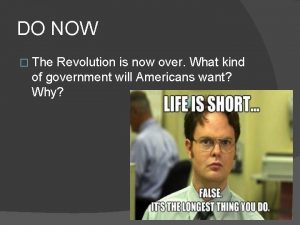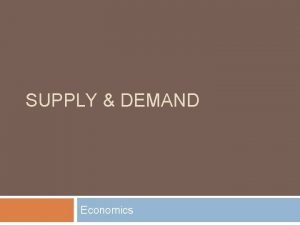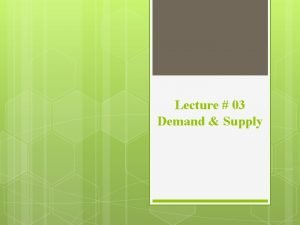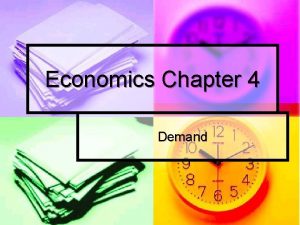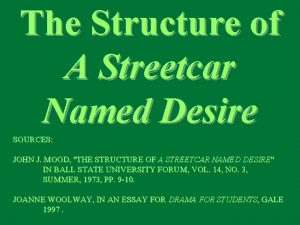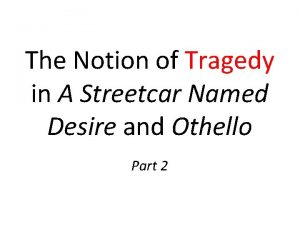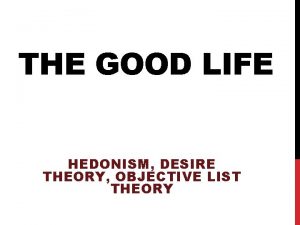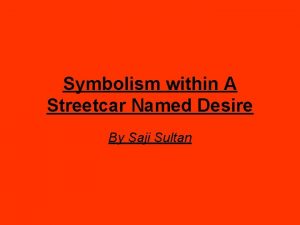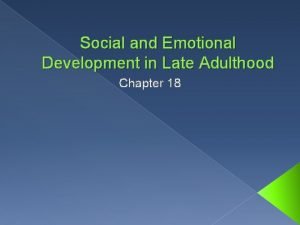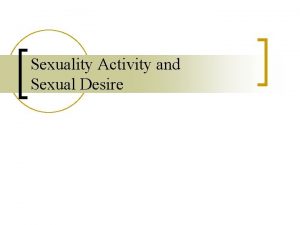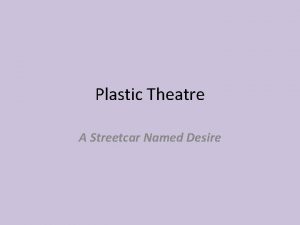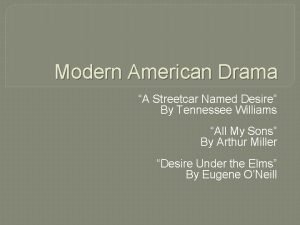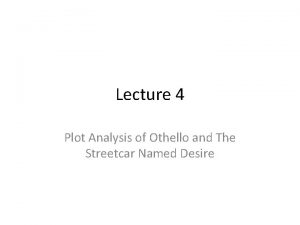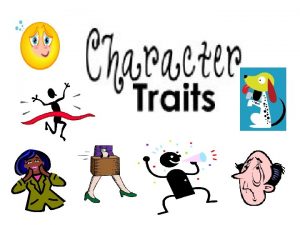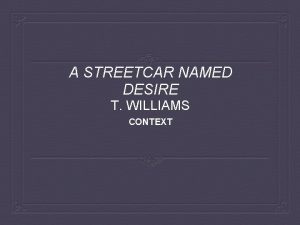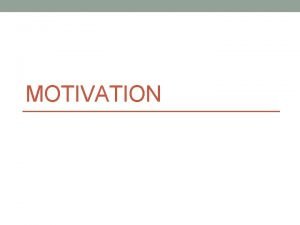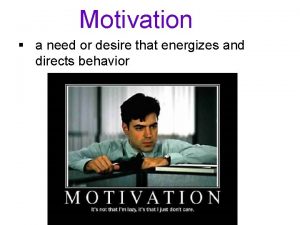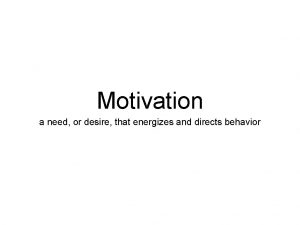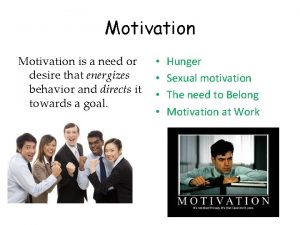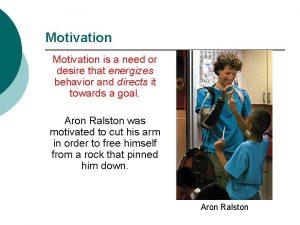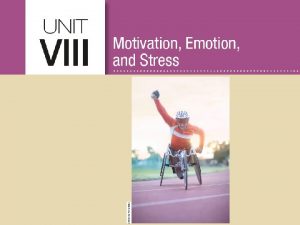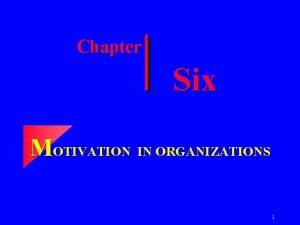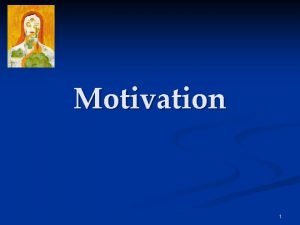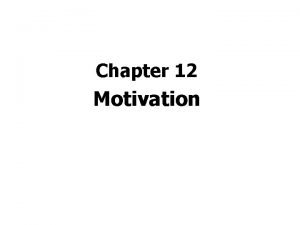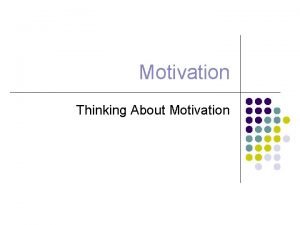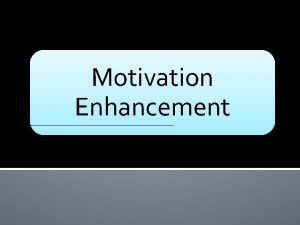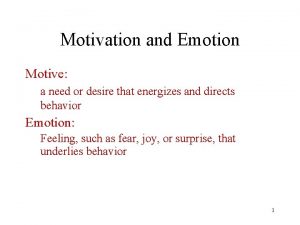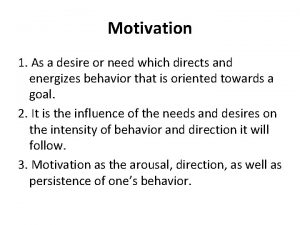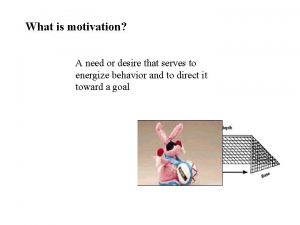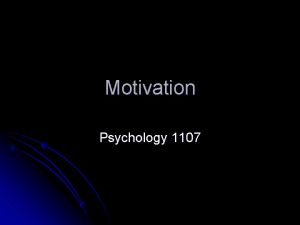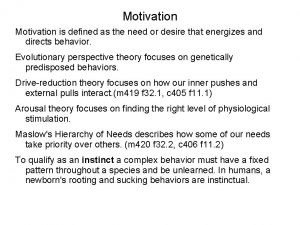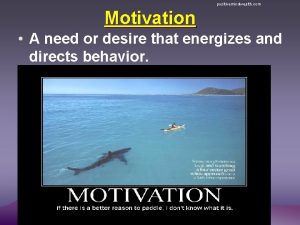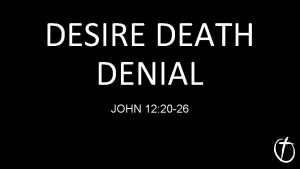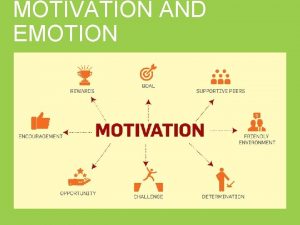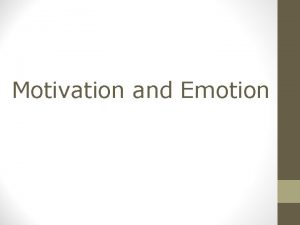Motivation A need or desire that energizes and














































- Slides: 46

Motivation • A need or desire that energizes and directs us to a behavior.

Aim: What are some competing theories explaining human motivation? Do Now: 1. Turn to page 15 in packet and answer Q # 1 – What are some reasons why a person may go to college. Homework: • Read “the Secret to Raising Smart Kids” p. 23 – 23 and answer Q’s on page 21

Aim: What are some competing theories explaining human motivation? Do Now: 1. Take out Americas Obesity Crisis. ? Hand in. 2. What are some reasons why people go to college? Homework: • Read Chapter 11 (Emotion) for Monday

Make a list of all of the possible reasons why a person might go to college. Page 15 1. Learn…

What motivates behaviors? Opposing Theories/ Explanations Task: 1. Fill in chart page 15 (summarize what motivates us according to theory).

Opposing Theories Theory Instinct Drive (Homeostasis) Incentive Explanation Example

Opposing Theories Theory Expectancy Optimal Arousal Opponent Process Explanation Example

Check for Understanding? • Page 17 / • Identify which theory would be associated at the bottom.

What motivates us? Page 35 1. What motivates us according to Maslow? Does his ranking make sense? 2. How is his theory SIMILAR and DIFFERENT from the other theories we studied earlier? • https: //www. youtube. com/watch? v=9 hd. SLi. Ha. Jz 8&index=17&list=PL 8 d. Puua. Lj. Xt. OPRKz. V LY 0 j. JY-u. HOH 9 KVU 6 4: 51 – 6: 00

Maslow's Hierarchy of Needs

Aim: What motivates behaviors? Quick Review. Each of the following perspectives explains behavior in terms of … • Biological • Behavioral • Cognitive • Socio Cultural • Humanistic

Instinct Theory • Motivation is based on our instincts: • A behavior that is patterned throughout a species and is UNLEARNED.

Instinct Theory • Does not explain all our behaviors/ choices!

Drive Reduction Theory • Our behavior is motivated by physiological needs. • Motivated to maintain homeostasis. • Without homeostasis, we have a need that creates a drive. • Primary versus Secondary drives

Incentive Theory • Needs do push us but, • We are pulled by incentives: • a positive or negative environmental stimulus that motivates behavior

Optimum Arousal • We do not always seek homeostasis but sometimes we seek arousal. • Everyone's optimal level of arousal is different • Our needs go beyond reducing drives.

Similar or different from social facilitation?

Yerkes-Dodson Law • Performance peaks at lower levels of arousal for difficult tasks, and at higher levels for easy or well-learned tasks Performance level Difficult tasks Low Easy tasks Arousal High

ARMY • http: //www. ispot. tv /ad/7 fw. R/us-armydefy-expectationsdrill-sergeant

Red Bull • http: //www. youtube. com/watch? v=n. Xa 02 t. B 8 DL o

Febreeze • http: //www. ispot. tv/ ad/7 q. LL/febrezesleep-serenity-lightsout • http: //www. ispot. tv/ ad/7 d. Xy/febrezestick-and-refreshoverflowing-garbage

Fun Theory/ VW • http: //www. youtu be. com/watch? v= QZn. EIm. P 7 Ea. M • http: //www. youtu be. com/watch? v= cb. EKAw. Co. CKw&fe ature=related

Gatorade • http: //www. ispot. tv/a d/7 f. I 9/gatorade-hardwork • http: //www. youtube. c om/watch? v=w. Nj. Qish YOy 0

Toyota/Prius • http: //www. youtube. com/watch? v=gw 20 ss. NMQl. U • http: //www. ispot. tv/ ad/7 IBB/2013 -toyota -prius-sewing-room

Olive Garden • http: //www. youtube. com/watch? v=Sksmt. Ta_ CFs

Brita • http: //w ww. yout ube. com /watch? v=9 b. Db Ohpna. E w

Aim: What are some competing theories explaining human motivation? Why do we eat? Do Now: 1. Complete Check for Understanding for motivation theories page 35 (bottom chart). Homework: • Read Chapter 11 (Emotion) for Tuesday

Check for understanding.

Page 15 – Bottom FRQ - Explain Sara’s smoking behavior. Why she started smoking OR why she is having difficulty quitting. • • • Instinct Drive- Reduction Incentive Expectancy Optimal Arousal Opponent Process

Hunger Task: 1. Take out the article/ HW. 2. Share discuss reactions/questions you had. Pick one to discuss whole class.

Hunger Task: 1. Hunger is both physiological and psychological. 2. How can we apply these theories to managing our weight/ losing weight? Apply one specific theory.

Check for Understanding TASK: Complete p. 44 – 45 in packet using your HW and the word pool for assistance.

Physiology of Hunger • Washburn’s studies showed hunger was partially related to the stomach. • But those with their stomachs removed still feel hunger.

Biological Basis of Hunger • Hunger does NOT come from our stomach. It comes from our… • Brain What part of the brain? • The Hypothalamus

The Brain In the 1960’s it was discovered that hunger comes from………. . The Hypothalamus

Hypothalamus Lateral Hypothalamus • When stimulated it makes you hungry. • When lesioned (destroyed) you will never be hungry again. Ventromedial Hypothalamus • When stimulated you feel full. • When lesioned you will never feel full again.

How does the hypothalamus work? Two Theories Leptin • Leptin is a protein produced by bloated fat cells. • Hypothalamus senses rises in leptin and will curb eating and increase activity. • Can leptin injections help me? • • Set Point Hypothalamus acts like a thermostat. We are meant to be in a certain weight range. When we fall below weight our body will increase hunger and decrease energy expenditure (Basic Metabolic Rate). What happens if we go above our set point?

Body Chemistry • Glucose • The hormone insulin converts glucose to fat. • When glucose levels drop- hunger increases.

Psychological Aspects of Hunger • Internals versus Externals • The Garcia Effect

Culture and Hunger

Dog Mice Wine Fried Frog Legs Criadillas- bull testicles.

Taste Preferences Food taste better and we chew less when we are hungry (beginning of a meal). Food tastes worse and we chew more when we are not hungry (at the end of the meal). Its weird, the better the food tastes, the less time we leave it in our mouths.

Anorexia Nervosa • Starve themselves to below 85% of their normal body weight. • See themselves as fat. • Vast majority are woman.

Eating Disorders Bulimia Nervosa • An eating disorder characterized by episodes of overeating, usually of high caloric foods, followed by vomiting, laxative use, fasting, or excessive exercise.

Body Image

Obesity • Severely overweight to the point where it causes health issues. • Mostly eating habits but some people are predisposed towards obesity. Click on the pictures to see some case studies on obesity.
 What do we call a need or desire that energizes behavior
What do we call a need or desire that energizes behavior Refractory period men
Refractory period men Elizabeth energizes england
Elizabeth energizes england Chapter 10 motivating and satisfying employees and teams
Chapter 10 motivating and satisfying employees and teams A desire for significant accomplishment
A desire for significant accomplishment The desire for significant accomplishment for mastery
The desire for significant accomplishment for mastery Is the desire to make significant accomplishments
Is the desire to make significant accomplishments Preparatory change talk examples
Preparatory change talk examples Ngoại tâm thu thất chùm đôi
Ngoại tâm thu thất chùm đôi Block nhĩ thất độ 2 mobitz 1
Block nhĩ thất độ 2 mobitz 1 Thể thơ truyền thống
Thể thơ truyền thống Thơ thất ngôn tứ tuyệt đường luật
Thơ thất ngôn tứ tuyệt đường luật Walmart thất bại ở nhật
Walmart thất bại ở nhật Tìm độ lớn thật của tam giác abc
Tìm độ lớn thật của tam giác abc Con hãy đưa tay khi thấy người vấp ngã
Con hãy đưa tay khi thấy người vấp ngã Tôn thất thuyết là ai
Tôn thất thuyết là ai Gây tê cơ vuông thắt lưng
Gây tê cơ vuông thắt lưng Sau thất bại ở hồ điển triệt
Sau thất bại ở hồ điển triệt Egg
Egg Advantages of flow line maps
Advantages of flow line maps Both new hampshire and new york desire more territory
Both new hampshire and new york desire more territory Sacrifice and offering you did not desire
Sacrifice and offering you did not desire If they desire that piety and godliness
If they desire that piety and godliness Brethren my heart's desire and prayer
Brethren my heart's desire and prayer If they desire that piety and godliness
If they desire that piety and godliness Neil thisse is a loyalist answers
Neil thisse is a loyalist answers Examples of substitute goods
Examples of substitute goods Desire and demand
Desire and demand Demand is the desire,
Demand is the desire, Bassons model
Bassons model Minka dumont
Minka dumont Enduring issues essay example
Enduring issues essay example Structure of streetcar named desire
Structure of streetcar named desire Tragedy in a streetcar named desire
Tragedy in a streetcar named desire Objective list theory
Objective list theory Imagery in a streetcar named desire
Imagery in a streetcar named desire Scene 10
Scene 10 Socioemotional selectivity theory
Socioemotional selectivity theory Deflationary theory
Deflationary theory Sexual desire examples
Sexual desire examples What is plastic theatre streetcar named desire
What is plastic theatre streetcar named desire Expressionism in a streetcar named desire
Expressionism in a streetcar named desire Tragic hero othello
Tragic hero othello To wait seemed foolish when decisive action was required
To wait seemed foolish when decisive action was required Having a strong wish to be successful powerful or rich
Having a strong wish to be successful powerful or rich Theme of streetcar named desire
Theme of streetcar named desire A streetcar named desire historical context
A streetcar named desire historical context
